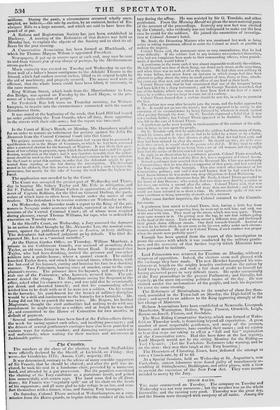In the Court of King's Bench, on Monday, Mr. Humphrey
applied for an order to remove an indictment for perjury against Sir John De Beauvoir from the Central Criminal Court into this Court.
The perjury assigned was, that the defendant had sworn that he possessed a qualification to sit in the House of Counnens, to which he had been returned after a contested election for the borough of Windsor. It was likely that ques- tions of law relating to property, upon which the defendant had rested his piali- fication, would arise at the time; and it was therefore desirable that the i odiet- anent should be tried in this Court. The defendant's station in life was sufficient for the Court to grant this motion, in order that the defendant might be pre- vented from standing at the bar during the investigation. The (1i:111'11a:it stated in his affidavit, that this motion was not made with a view to harass the prosecutor, but merely for the sake of having the trial before the highest tri- bunal.
The application was acceded to by the Court.
The Court was occupied the greater part of Wednesday and Thurs- day in hearing Mr. Sidney Taylor and Mr. Eric in mitigation, and Sir F. Pollock and Sir William Follett in aggravation, of the punish- ment of Captain Robison, for the libel on General Darling, the parti- culars of which have so often been brought under the notice of our readers. The defendant is to receive sentence on Wednesday next.
On Wednesday, the Recorder made a report to the King of the pri- soners in Newgate under sentence of death, convicted at the last three sessions of the Central Criminal Court ; all of whom were respited during pleasure, except Thomas Williams, for rape, who is ordered for execution on Tuesday next.
In the Sheriff's Court, on Wednesday, a Jury assessed the damages in an action for libel brought by Mr. Alexander Lee, the musical com- poser, against the publishers of Figaro in London, at forty shillings. The defendants had suffered judgment go by default. The libel de- signated Mr. Lee as a "musical swindler."
At the Hatton Garden Office, on Thursday, William Merchant, a private in the Coldstream Guards, was accused of assaulting John Taylor, an old man, living in St. John Street Road. It appeared that Taylor, who had been drinking, invited the prisoner and two other soldiers into a public-house; where a quarrel ensued. The soldier knocked Taylor down, and struck him several times, when down, with the but-end of his bayonet, cutting and bruising his face in a shocking manner. Two Policemen, hearing cries of murder, came to the com- plainant's rescue. The prisoner drew his bayonet, and attemptcd to stab one of the Policemen ; who, however, secured him. The pri- soner denied the charge. The Magistrate seeing his Sergeant in the office, asked what his character was ; and was told that he occasionally got drunk and absented himself; and that his commanding officer wished him to be dealt with as if he were not a soldier. On his return to the barracks, his l -shment for the breach of military discipline would be a drill and confinement to the barracks for a fortnight. Mr. Laing did not like to punish the man twice. Mr. Rogers, his brother Magistrate, thought the civil authorities had nothing to do with any punishment he might receive as a soldier, and at length he was tined N., and committed to the House of Correction for two months, in default of payment.
' Several omnibus drivers have been fined at the Police-offices during the week for racing against each other, and insulting passengers ; and the drivers of several gentlemen's carriages have also been punished in various ways for riotous conduct, and damaging carriages, carelessly and maliciously, when waiting for their masters and mistresses at fashionable parties.


























 Previous page
Previous page